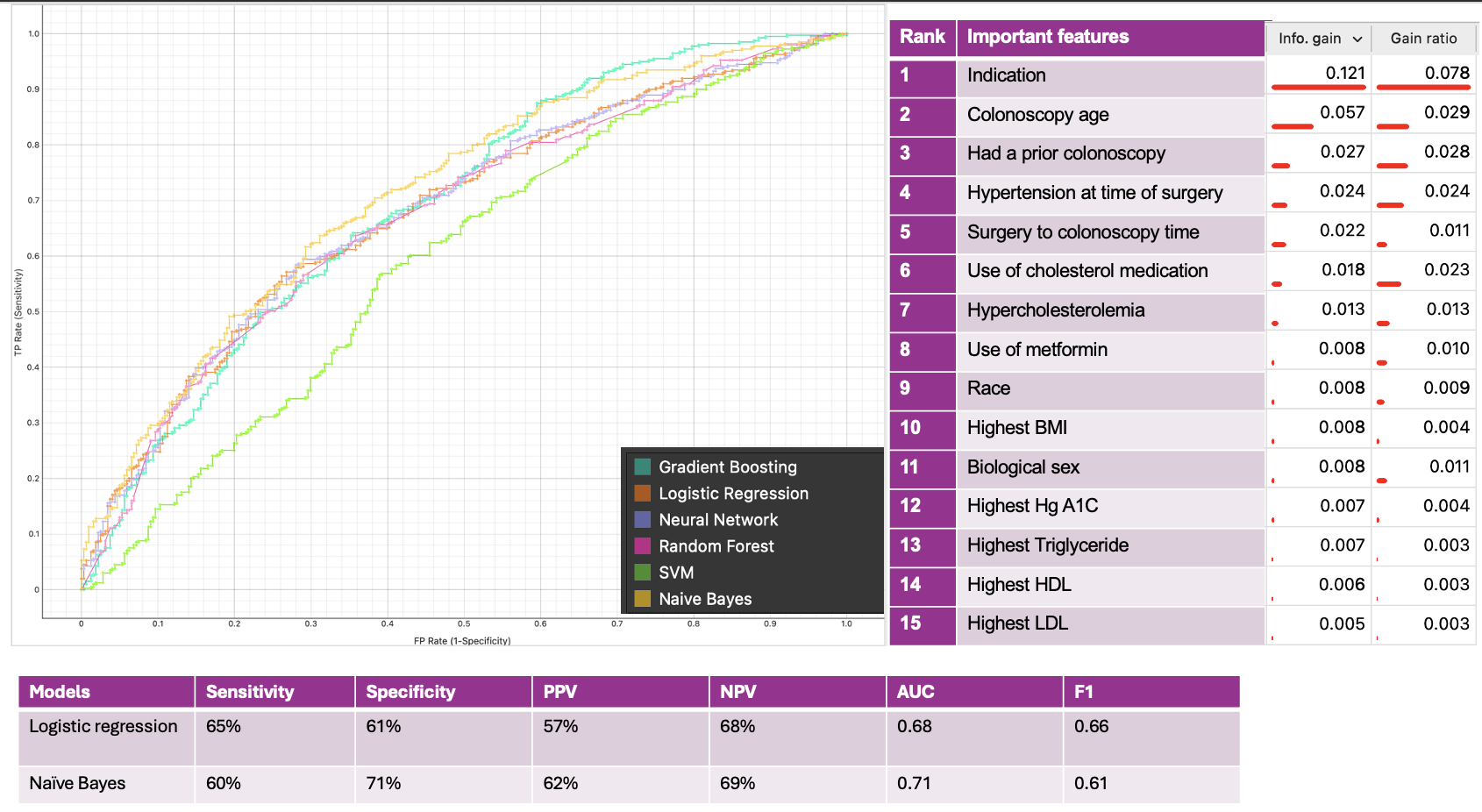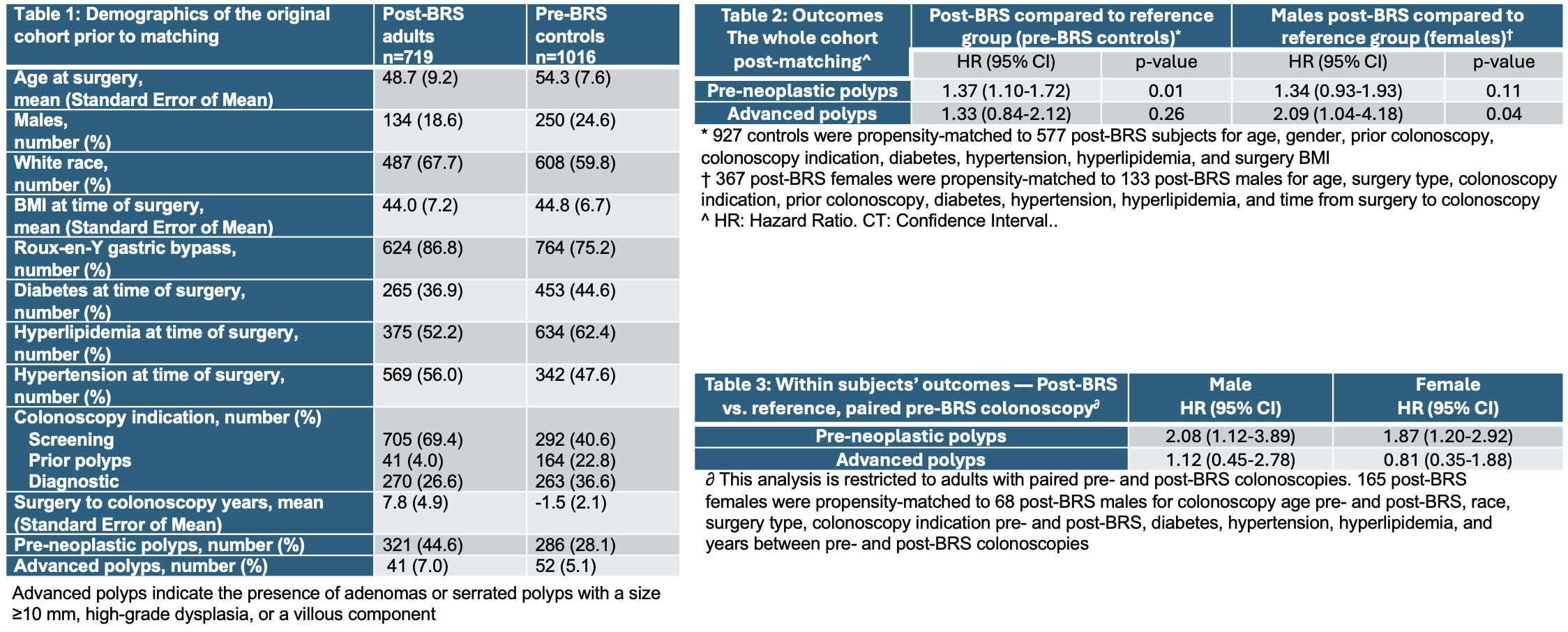Tuesday Poster Session
Category: Colorectal Cancer Prevention
P4800 - Sex-Specific Differences in Risk of Colorectal Polyps After Bariatric Surgery: Leveraging Machine Learning (ML) Techniques to Identify At-Risk Individuals
Tuesday, October 28, 2025
10:30 AM - 4:00 PM PDT
Location: Exhibit Hall
- JC
Jacqueline Chang, MD (she/her/hers)
University of California Davis Health Graduate Medical Education
Sacramento, CA
Presenting Author(s)
Jacqueline Chang, MD1, Eric McLaughlin, MS2, Henry Thompson, PhD3, Victoria Lyo, MD, MTM4, Aasma Shaukat, MD, MPH, FACG5, Sezin Sirin Hussan, MBA, MIM6, Guodong Zhang, PhD4, Hisham Hussan, MD4
1University of California Davis Health Graduate Medical Education, Sacramento, CA; 2Center for Biostatistics, The Ohio State University Wexner Medical Center, Columbus, OH; 3Colorado State University, Fort Collins, CO; 4University of California Davis, Sacramento, CA; 5NYU Grossman School of Medicine, Division of Gastroenterology and Hepatology, New York, NY; 6Senior Data Scientist - Independent, Sacramento, CA
Introduction: Obesity doubles colorectal cancer (CRC) risk. Yet, severe weight loss has mixed effects on CRC risk. With the most potent weight loss method, bariatric surgery (BRS), CRC risk is reportedly reduced in females; however, this effect disappears after 10 years, whereas CRC risk is unchanged in males. Scarce data exists on the risk of pre-neoplastic colorectal polyps after BRS. We aim to investigate whether sex differences exist and the potential for predicting these risks using machine learning (ML) methods.
Methods: This single-center, retrospective study included patients with a Body Mass Index (BMI) >35 kg/m² who underwent BRS from 2002-2023. Adults aged 18 and older who underwent a colonoscopy after Roux-en-Y gastric bypass or sleeve gastrectomy were compared to controls who had colonoscopies pre-surgery. Subjects with inflammatory bowel disease or personal/familial CRC were excluded. We evaluated the risk of polyps in males and females post-BRS, confirmed in a paired sensitivity analysis that examined the risk of polyps within these subjects. A prediction model employing six ML models was also created to identify individuals at risk for polyp development.
Results: A colonoscopy was performed on 47% of BRS adults between 2002-2023. In total, 1,735 patients met the inclusion criteria (719 post-BRS and 1016 controls; 22% male). Pre-matching, both groups were similar in age and BMI at the time of surgery (Table 1). BRS led to an impactful weight loss (mean post-BRS colonoscopy BMI of 35 kg/m² vs. 44 kg/m² at baseline). Post-BRS adults trended towards a higher risk of polyps, which remained significantly elevated after propensity score matching (Hazard Ratio=1.37, 95%CI: 1.10-1.72, Table 2). Further, males had a higher risk of advanced polyps compared to females after BRS (Hazard Ratio=2.09, 95%CI: 1.04-4.18, Table 2). These findings persisted in a paired, propensity-matched analysis (Table 3). Our ML analysis produced effective predictive models for identifying polyps, with Logistic Regression and Naïve Bayes showing the best discrimination capability—Logistic Regression at 65% sensitivity and Naïve Bayes at 71% specificity. Key predictive factors of polyps post-BRS included colonoscopy indication, age, metabolic markers, and sex (Fig. 1).
Discussion: We identified an increased risk for polyps post-BRS and highlight sex-based trends in these risks. ML seems effective in predicting the risk of polyps, which provides an opportunity to enhance CRC screening uptake in at-risk adults post-BRS.

Figure: Summary of cohort characteristics pre-matching (Table 1); outcomes post-BRS vs. controls and sex-based comparisons after propensity matching (Table 2); propensity-matched, within-subject differences in polyp risk in males vs. females post- vs. pre-BRS (Table 3).

Figure: Receiver Operating Characteristic (ROC) Curves: Discrimination Abilities and Key Features of Our Machine Learning Models.
Disclosures:
Jacqueline Chang indicated no relevant financial relationships.
Eric McLaughlin indicated no relevant financial relationships.
Henry Thompson indicated no relevant financial relationships.
Victoria Lyo indicated no relevant financial relationships.
Aasma Shaukat: Freenome inc – Consultant.
Sezin Sirin Hussan indicated no relevant financial relationships.
Guodong Zhang indicated no relevant financial relationships.
Hisham Hussan indicated no relevant financial relationships.
Jacqueline Chang, MD1, Eric McLaughlin, MS2, Henry Thompson, PhD3, Victoria Lyo, MD, MTM4, Aasma Shaukat, MD, MPH, FACG5, Sezin Sirin Hussan, MBA, MIM6, Guodong Zhang, PhD4, Hisham Hussan, MD4. P4800 - Sex-Specific Differences in Risk of Colorectal Polyps After Bariatric Surgery: Leveraging Machine Learning (ML) Techniques to Identify At-Risk Individuals, ACG 2025 Annual Scientific Meeting Abstracts. Phoenix, AZ: American College of Gastroenterology.
1University of California Davis Health Graduate Medical Education, Sacramento, CA; 2Center for Biostatistics, The Ohio State University Wexner Medical Center, Columbus, OH; 3Colorado State University, Fort Collins, CO; 4University of California Davis, Sacramento, CA; 5NYU Grossman School of Medicine, Division of Gastroenterology and Hepatology, New York, NY; 6Senior Data Scientist - Independent, Sacramento, CA
Introduction: Obesity doubles colorectal cancer (CRC) risk. Yet, severe weight loss has mixed effects on CRC risk. With the most potent weight loss method, bariatric surgery (BRS), CRC risk is reportedly reduced in females; however, this effect disappears after 10 years, whereas CRC risk is unchanged in males. Scarce data exists on the risk of pre-neoplastic colorectal polyps after BRS. We aim to investigate whether sex differences exist and the potential for predicting these risks using machine learning (ML) methods.
Methods: This single-center, retrospective study included patients with a Body Mass Index (BMI) >35 kg/m² who underwent BRS from 2002-2023. Adults aged 18 and older who underwent a colonoscopy after Roux-en-Y gastric bypass or sleeve gastrectomy were compared to controls who had colonoscopies pre-surgery. Subjects with inflammatory bowel disease or personal/familial CRC were excluded. We evaluated the risk of polyps in males and females post-BRS, confirmed in a paired sensitivity analysis that examined the risk of polyps within these subjects. A prediction model employing six ML models was also created to identify individuals at risk for polyp development.
Results: A colonoscopy was performed on 47% of BRS adults between 2002-2023. In total, 1,735 patients met the inclusion criteria (719 post-BRS and 1016 controls; 22% male). Pre-matching, both groups were similar in age and BMI at the time of surgery (Table 1). BRS led to an impactful weight loss (mean post-BRS colonoscopy BMI of 35 kg/m² vs. 44 kg/m² at baseline). Post-BRS adults trended towards a higher risk of polyps, which remained significantly elevated after propensity score matching (Hazard Ratio=1.37, 95%CI: 1.10-1.72, Table 2). Further, males had a higher risk of advanced polyps compared to females after BRS (Hazard Ratio=2.09, 95%CI: 1.04-4.18, Table 2). These findings persisted in a paired, propensity-matched analysis (Table 3). Our ML analysis produced effective predictive models for identifying polyps, with Logistic Regression and Naïve Bayes showing the best discrimination capability—Logistic Regression at 65% sensitivity and Naïve Bayes at 71% specificity. Key predictive factors of polyps post-BRS included colonoscopy indication, age, metabolic markers, and sex (Fig. 1).
Discussion: We identified an increased risk for polyps post-BRS and highlight sex-based trends in these risks. ML seems effective in predicting the risk of polyps, which provides an opportunity to enhance CRC screening uptake in at-risk adults post-BRS.

Figure: Summary of cohort characteristics pre-matching (Table 1); outcomes post-BRS vs. controls and sex-based comparisons after propensity matching (Table 2); propensity-matched, within-subject differences in polyp risk in males vs. females post- vs. pre-BRS (Table 3).

Figure: Receiver Operating Characteristic (ROC) Curves: Discrimination Abilities and Key Features of Our Machine Learning Models.
Disclosures:
Jacqueline Chang indicated no relevant financial relationships.
Eric McLaughlin indicated no relevant financial relationships.
Henry Thompson indicated no relevant financial relationships.
Victoria Lyo indicated no relevant financial relationships.
Aasma Shaukat: Freenome inc – Consultant.
Sezin Sirin Hussan indicated no relevant financial relationships.
Guodong Zhang indicated no relevant financial relationships.
Hisham Hussan indicated no relevant financial relationships.
Jacqueline Chang, MD1, Eric McLaughlin, MS2, Henry Thompson, PhD3, Victoria Lyo, MD, MTM4, Aasma Shaukat, MD, MPH, FACG5, Sezin Sirin Hussan, MBA, MIM6, Guodong Zhang, PhD4, Hisham Hussan, MD4. P4800 - Sex-Specific Differences in Risk of Colorectal Polyps After Bariatric Surgery: Leveraging Machine Learning (ML) Techniques to Identify At-Risk Individuals, ACG 2025 Annual Scientific Meeting Abstracts. Phoenix, AZ: American College of Gastroenterology.

